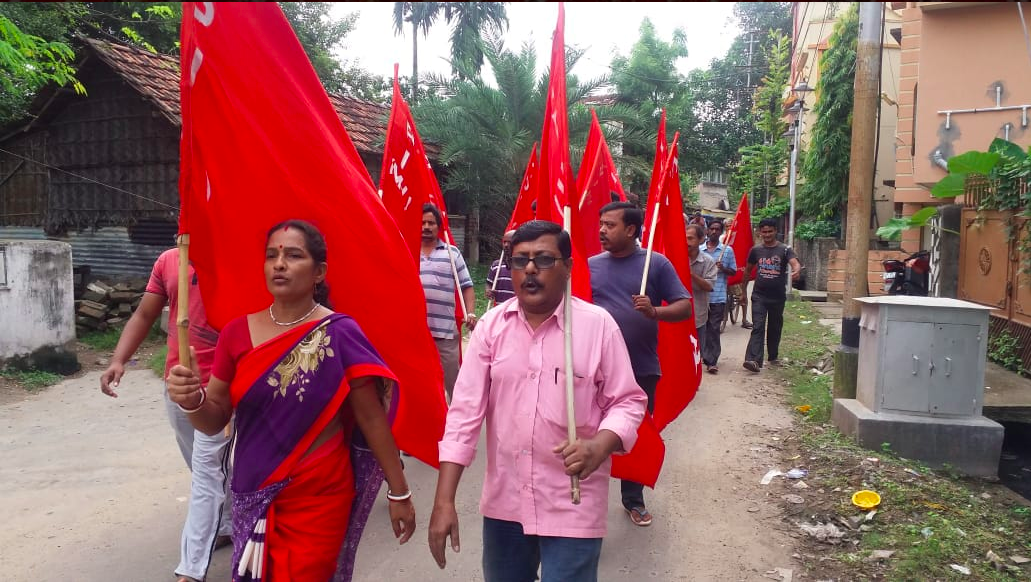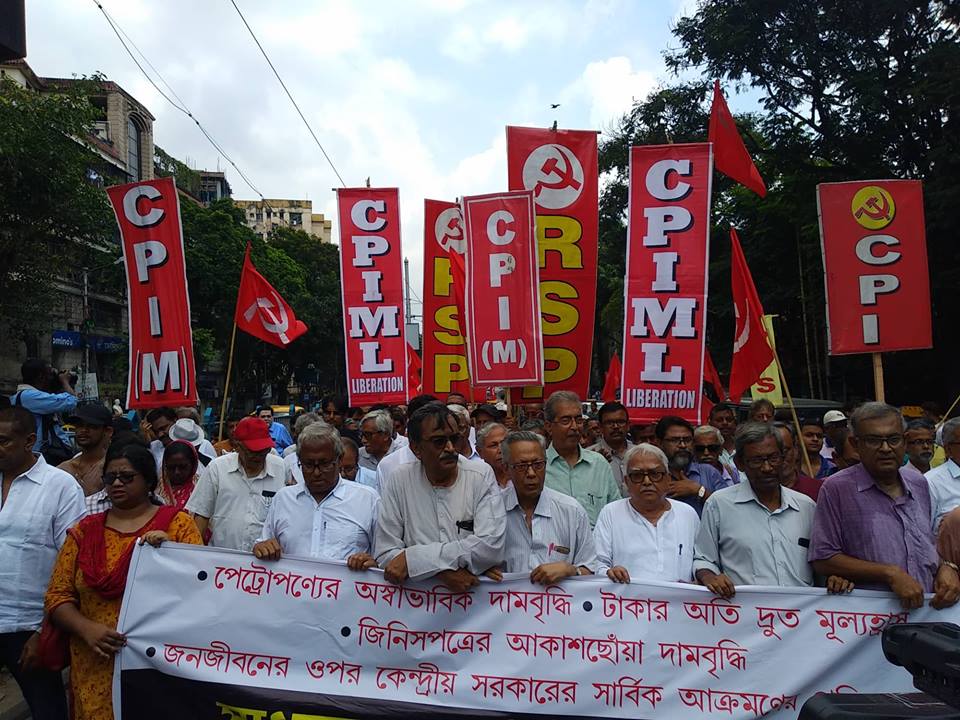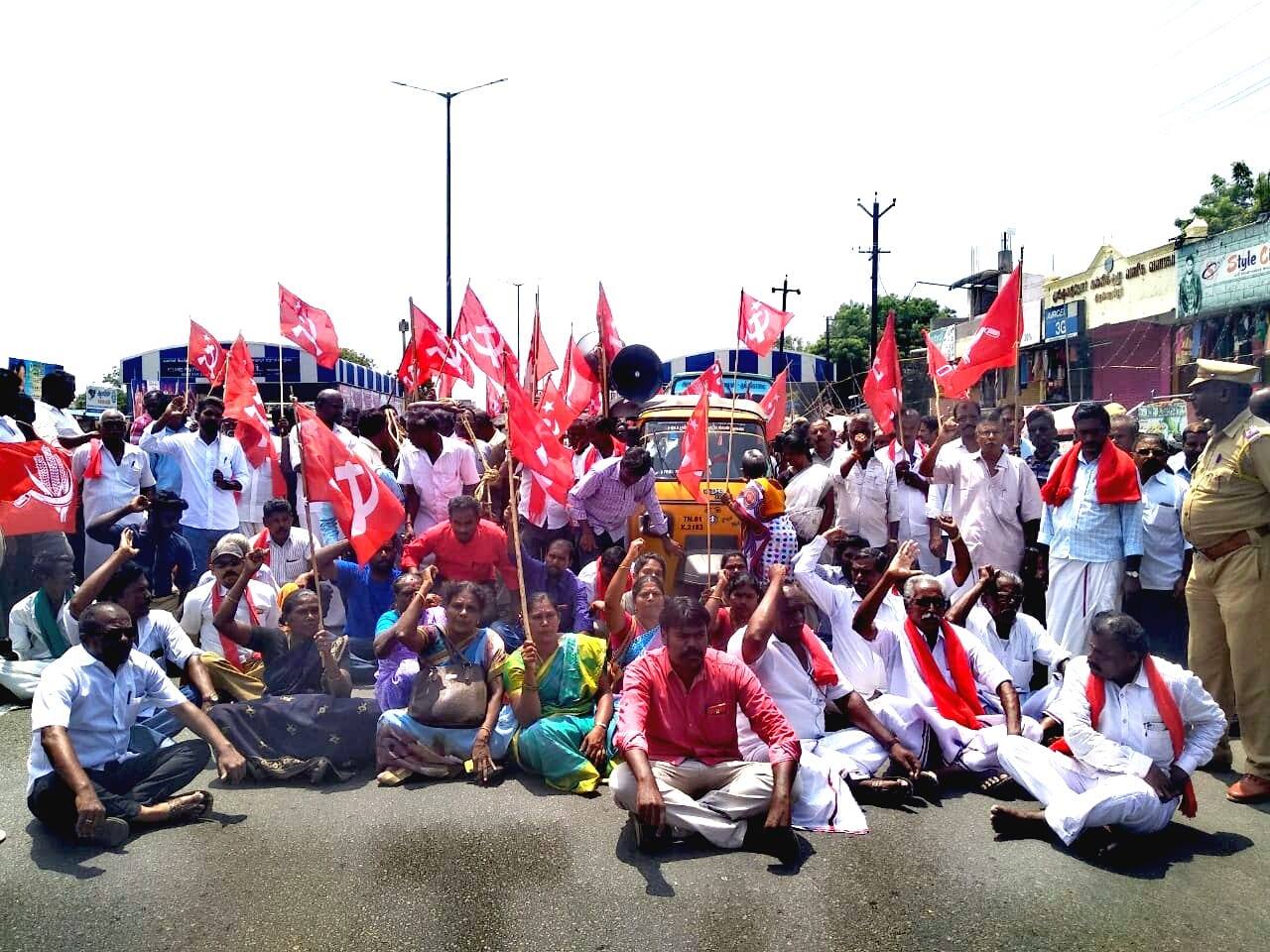Many parts of India, on Monday, came to a complete standstill, as Left parties and other opposition parties called for a ‘Bharat Bandh’ – a nationwide shutdown over increasing economic burdens on the working class.
From early morning, activists from various Left parties and mass organizations took out processions against the skyrocketing fuel prices, which have crippled the livelihood of people across the country.
“We all must protest in the strongest manner to force this callous Narendra Modi government to reduce fuel prices by cutting excise duty drastically,” said Sitaram Yechury, general secretary of the Communist Party of India (Marxist), speaking to Newsclick. Yechury and D. Raja of the Communist Party of India were taken into custody by the Delhi police over the protests. In many areas, trains were stopped and roadways were blocked. The police attempted to thwart the protesters by taking them into custody.
In the western state of Gujarat, central committee member of CPI(M) Arun Mehta, along with 50 other activists, was arrested.
People took out processions on bullock carts to protest the soaring prices of petrol and diesel, which have touched INR 80 and INR 72 per litre. Though the rising fuel prices are associated with the surge in global oil prices and the weakening of the rupee against the dollar, the aggressive neoliberal policies adopted by the Indian government have exacerbated the impact of these on the working class.

Protesters called the government headed by the far-right wing prime minister Narendra Modi as ‘stooges of corporate and elites and demanded its resignation.
“The exponentially rising prices of petroleum products is having a crippling effect on the livelihood of crores of Indians. The farmers, already groaning under mounting agrarian distress, see their production costs further escalated,” noted a statement by the Communist Party of India (Marxist), Communist Party of India (Marxist-Leninist) Liberation and Communist Party of India, along with other left parties on September 6. The centrist party, Indian National Congress, later extended its support to the shutdown.
“This price rise has a cascading all-round inflationary impact,” the statement further noted.
It is interesting to note that in India, which is primarily an oil-consuming country, a major component of the fuel prices is the taxes imposed by the state.
The shutdown also focused on the ‘Rafale scam’, which is related to the purchase of 36 multi-role fighter aircraft from France at an estimated price of INR 58,000 crore or 7.8 billion euros. Though the Indian government has refused to divulge the exact cost of the fighter, it is estimated that the price is three times higher than the what was proposed during the first negotiation which took place in 2012. Furthermore, the deal between Rafale’s manufacturer, Dassault Group, and India-based Anil Ambani’s Reliance Group, considered close to the ruling establishment, has led to serious allegations of crony capitalism. It is alleged that Ambani’s Reliance Defence venture received the around 70% of the Rafale offset contact despite having no prior experience in manufacturing defence equipment or assets. The offset clause of the Rafale deal between France and India places an obligation on the manufacturer that 50% of the cost of the deal has to be spent in India.
Another major economic crisis that India is facing involves a large number of corporate non-performing assets (NPAs), which are loan defaulters. Since the government under Modi came to power in 2014, there has been a rise in the number of large corporate loan defaulters, such as Indian businessmen Vijay Mallya and Nirav Modi, who managed to run away to foreign countries. Both Mallya and Modi are close to the establishment in India. According to information available, the government has waived off loans of nearly INR 4 lakh crores taken by corporates during the last four years.

This month, India also saw two other massive people’s mobilizations against the far-right Indian government and its policies. On September 5, more than two lakh workers and farmers marched to the Indian parliament against the anti-people, pro-corporate and religious sectarian policies of the government. On September 4, around 10,000 women, defying heavy rain, marched in New Delhi against the rising violence against women, hatred, hunger and unemployment. The protesters denounced the members of the ruling Bharatiya Janata Party (BJP) for extending support to those who committed crimes against women.





